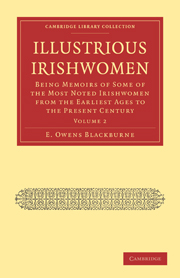 Illustrious Irishwomen
Illustrious Irishwomen LADY LOUISA CONOLLY
Published online by Cambridge University Press: 07 September 2011
Summary
born, a.d. 1742. died, a.d. 1821.
I AM amazed you did not know that Lord Mornington had made his addresses to Lady Louisa Lennox,” says Mrs. Delany in one of her letters,—“young Lady Kildare's sister, a pretty girl, about sixteen. He was well received, and much encouraged by all the family, and no appearance of dislike in the young lady; but before an answer was positively given, Mr. Conolly, with double his fortune (and perhaps about half his merit), offered himself, and was accepted. The answer to Lord Mornington was, that ‘the young lady had an insurmountable dislike to him.’”
But Mrs. Delany was wrong in her surmises about Lady Louisa's choice. The Right Hon. Thomas Conolly was a most excellent husband, and a most estimable man in every relation of life. He was one of His Majesty's Privy Councillors, and for forty years represented the County of Londonderry. He died at his residence of Castle town, deeply and sincerely regretted for his public and private worth.
His wife, Lady Louisa Conolly, was the third daughter of Charles, second Duke of Richmond. Her two sisters were Lady Kildare, famous for her wit and sprightliness, and Lady Sarah Lennox, no less celebrated for her beauty. Mrs. Delany calls Lady Louisa “a pretty girl,” but makes no special comment upon her appearance; and as the observant old lady invariably noted anything remarkable in the manners or appearance of her acquaintances, we may take it for granted that the charms of Lady Sarah eclipsed those of her afterwards more famous sister.
- Type
- Chapter
- Information
- Illustrious IrishwomenBeing Memoirs of Some of the Most Noted Irishwomen from the Earliest Ages to the Present Century, pp. 330 - 334Publisher: Cambridge University PressPrint publication year: 2010First published in: 1877


